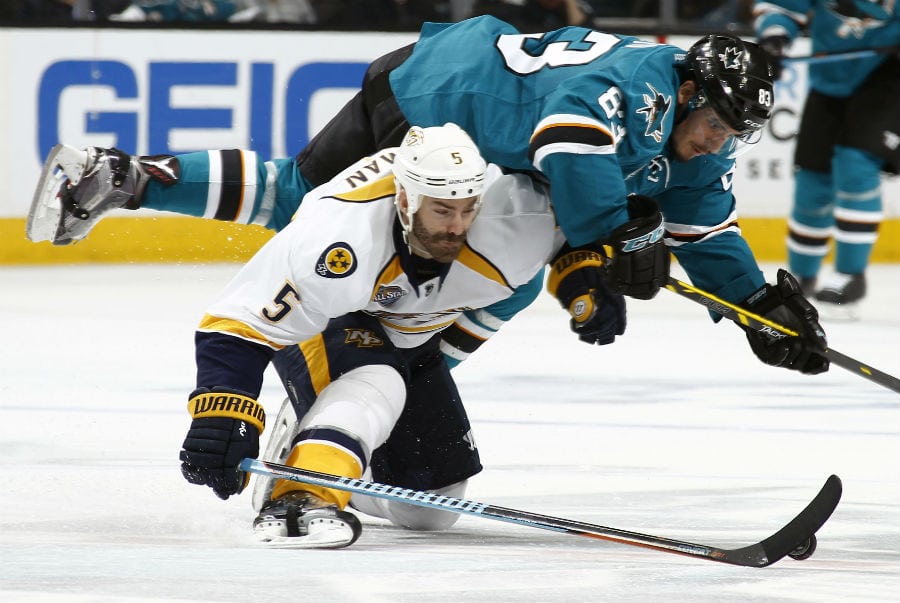
Barret Jackman: One of the last of a dying breed in the NHL
As Barret Jackman gets set to call it a career, we're left to wonder whether kids such as Barret Jackman can even have a chance at the NHL anymore.
 Barret Jackman: One of the last of a dying breed in the NHL
Barret Jackman: One of the last of a dying breed in the NHLBarret Jackman will announce his retirement Tuesday in St. Louis, the place where it all began for him as an NHL player. But when you consider his actual humble beginnings, the fact that he played 876 games in the best league in the world is all that more impressive.
And with the upper levels of the game becoming more and more out of reach for those who don’t have at least a reasonable amount of wealth, we should appreciate the likes of Barret Jackman. With the game costing more than ever before and families spending thousands of dollars on one-on-one coaching, off-ice conditioning, spring hockey and sport-specific private schools just to keep up, the odds of someone such as Jackman getting to the NHL are getting smaller and smaller.
Jackman is a product of a place called Salmo, B.C., a little town in the Kootenays that didn’t even have a hockey arena when he was growing up. It did, however, have a curling rink that would open two weeks early to allow families to go skating. Jackman, whose parents divorced when he was an infant, did not have his father in his life and was basically raised in a one-parent household with two sisters.
There was certainly not enough money for extravagances. When MaryJane and Barret Jackman would go away for out-of-town tournaments, the mother often slept in her car to save herself from having to pay for a hotel room. Aside from going to hockey school in nearby Trail every summer, Barret Jackman simply played hockey in the winter and baseball in the summer. The only allowance MaryJane made for her son’s hockey was to move from Salmo to Fruitvale, where the Beaver Valley Minor Hockey Association was located. She did that so she wouldn’t have to spend almost an hour on the road driving her son to practices and games, leaving her more time to spend with her children.
That existence is in stark contrast to the staged-managed careers you find in many NHLers today. So the question remains, would a kid such as Barret Jackman be able to get to the NHL today without the resources it takes to play for the best travel teams and acquire the best hockey circumstances money can buy? The dilemma for those kids is that regardless of how good they are, those teams and programs serve to make elite kids more elite. They narrow the bottleneck so that the best kids get the best coaching and all the advantages. What that does is make them even better and those who can’t be part of that group, either by virtue of a lack of skill or money, fall further behind at an even younger age.
So it’s really tough. Then again, though, perhaps Barret Jackman and others like him made it to the NHL, because of their lack of resources. Who knows? Maybe it prompted Jackman to be hungrier and more dedicated, and that was what forged his path to hockey’s elite. To be sure, Jackman had a chip on his shoulder when he arrived in Regina as a 16-year-old. At one point, he took on a 19-year-old teammate whom Jackman felt wasn’t carrying his weight. “He was like the new dog on the playground,” former Pats GM Brent Parker once said. “He went out and pissed on every tree he could.”
Even MaryJane Jackman acknowledges that not having a dominant father figure in her son’s hockey life might have been a plus for him. How many players have been crushed by overbearing hockey parents? How many have wilted under the constant pressure to succeed? That was never a problem for Jackman, who played in the lowest competitive minor hockey level in British Columbia while his mother stayed out of the way.
“I think a lot of the things that go wrong for boys is the fault of fathers these days,” MaryJane Jackman once said. “They take the joy out of the game for a lot of them. They don’t enjoy what they’re doing and they’re pressured to do better.”
After her son went on to an NHL career, MaryJane Jackman billeted players for the Beaver Valley Nitehawks Jr. B team and served as the team’s trainer for five seasons. In that time, she saw a lot of kids with silver spoons in their mouths come and go. “I saw a lot of kids coming in and out and they don’t think they should be here, they think they should be somewhere else,” she once said. “They’re not appreciating what people are doing for them at this level. They’re not even learning because they’re thinking, ‘I don’t belong here. Next year I’ll be where I’m supposed to be,’ sort of thing.”
That did not happen with Barret Jackman because it never could have happened to him given his circumstances. And when he retires Tuesday after playing almost 900 games, he’ll be able to look back on a career where he truly earned every one of the $34 million he made




